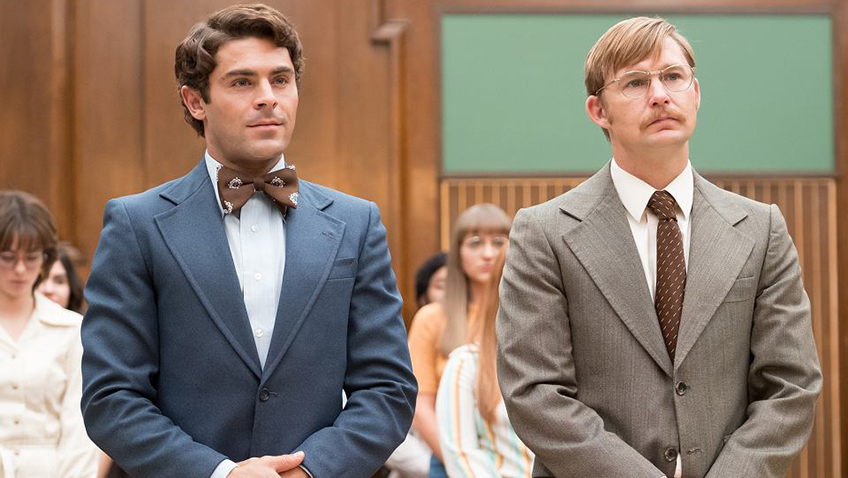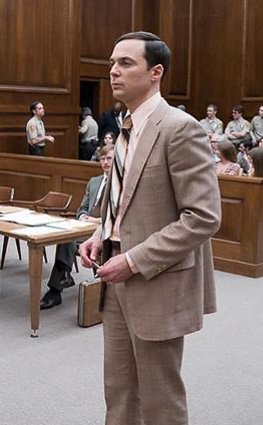Joyce Glasser reviews Extremely Wicked, Shockingly Evil and Vile (May 3, 2019), Cert. 15, 110 min.
If you have been watching Joe Berlinger’s riveting documentary The Ted Bundy Tapes on Netflix, you might wonder what his feature film covering the same territory could bring to the table that is not already known. The answer is nothing really, except a point of view that helps explain how America’s most notorious serial rapist/murderer could have had a relationship with his girlfriend, Elizabeth Kloepfer (Lily Collins) and her child for six years. There is also the pleasure of hearing John Malkovich’s Judge Edward Cowart deliver the film’s title in his description of Bundy’s crimes, and then there is Zac Efron. While the documentary gives you the real deal, Berlinger gives us an uncanny, bravura performance from Efron who gets inside the mind of a psychopath.
Ted Bundy, arguably America’s most famous and prolific serial killer, is so infamous that the challenge in such a film is how to introduce suspense. The solution was to base the film on Elizabeth’s memoir (written under the pseudonym Kendall), The Phantom Prince: My Life with Ted Bundy. In this way we see the monster from the point of view of the lonely single mother and University of Washington Medical School clerk desperate for someone to care for her and her daughter.
And, of course, with this POV, we do not see him commit the brutal murders. What we do see are years of doubting, and Liz’s gradual bonding with a sympathetic, nerdy work colleague who is the opposite of Ted, but a shoulder to cry on.
Ted was 27 and had been living with Liz for about four years when the sketch appeared in the local paper in connection with the disappearance of two young women from Lake Sammamish National Park in 1974. The witness who helped produce the sketch mentioned a Volkswagen similar to Ted’s as well. Liz was concerned enough to go to the police but we do not find out about that until she confesses the same to Ted when he is safely behind bars.
You would love to find out what happened to the detectives who dismissed Liz’s suspicions allowing him to continue his multi-state killing spree.
Liz continues living with Ted and we see their normal family life, but not much of his bursts of abusive behaviour. He was a psychopath; a practised liar, thief (he shoplifted almost everything he owned) and manipulator, not to mention rapist and murderer. He used his good looks, intelligence and charm to quash all of Liz’s doubts and even justify a meat cleaver and surgical gloves that she came across.
The decision to focus on Liz’s POV has its drawbacks. On the one hand it enables Berlinger to keep us in doubt, just as Ted keeps Elizabeth (‘Liz’) guessing and wondering. In this way an element of tension is introduced if (and it’s a big if) we can forget momentarily that we know the outcome. But as Ted wanders further and further from Seattle for ‘work’, and their relationship cools, we cannot keep track of Ted and still see things from Liz’s point of view without various mechanisms, one being a series of long distance phone calls.
Fortunately Ted really did continue to call Liz, even after he is reunited with Carole Ann Boone (Kaya Scodelario), an old work colleague who still carries a flame for him. Desperate for a gullible woman to be his contact with the outside world, Ted pretends to care for Carole who happily serves as a one-woman PR firm, gal Friday and – just around the time he sentenced to death – mother of his child.
And of course since Ted’s trial was the first in US history to be broadcast, Liz has the opportunity to watch her former lover’s inflated ego manifest itself in the courtroom, particularly after he dismisses his lawyer and is somehow granted permission (though he never qualified as a lawyer) to represent himself. In a particularly fascinating scene we are reminded how Ted sabotaged his only chance of avoiding the death penalty by refusing to admit his guilt in exchange for life in prison.
But while Collins has transformed herself (as has Efron with is telltale crooked teeth), physically, when she sits and watches the trial it is difficult to read her emotions. Her character is so underwritten that she sheds very little light on the man.
While not seeing Ted commit the vile deeds is a blessing, it is only in scenes in which Ted chats up girls in bars (as he did Liz) and impresses unsuspecting co-eds with his charm that emotions such as suspense and fear can be introduced. Pre-murder scenes (there are one or two fleeting ones) give the viewer the ‘there but for the grace of god go I’ relief.
Berlinger’s lacklustre directing style means that for most of the movie we are simply following Efron’s Ted Bundy doing many of the things that the real Bundy does in the Netflix series and are a matter of public record.
In his 2001 film Roberto Succo, French filmmaker Cedric Kahn used techniques similar to Berlinger’s, including the POV of the Italian serial killer’s naïve, underage girlfriend, and the absence of any depictions of murder to great dramatic effect. The tense, nail biting film that combines kidnap sequences with a chilling character study are utterly absorbing. Succo did not have Ted’s good looks, charm and intelligence but he was amazingly skilled at avoiding capture, even more so than Ted who masterminds two impressive, but short-lived escapes in the film.
You can watch the film trailer here:







